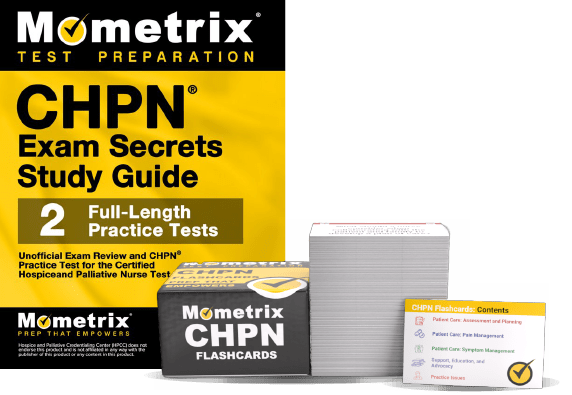If you need help studying for the Certified Hospice and Palliative Nurse (CHPN®) exam or just want some more information about what the exam is like, you’ve come to the right place.
Click below to take a free CHPN practice test!
Exam Eligibility
Before you can register to take the CHPN exam, you’ll need to hold a current and valid RN license.
You’ll also need to have at least 500 hours of hospice and palliative care nursing practice within the last year (or 1,000 within the last two years).
If you meet these requirements, you’re set to begin the registration process!
What’s on the Exam?
First, let’s talk about the questions on the exam. There are 150 multiple-choice questions total, but only 130 of the questions will count toward your score. Why is that?
The 15 unscored questions on the exam are called “pretest” questions. These are added to the exam to determine if they’re good enough questions to add to future versions of the test.
The trick is that you won’t have any way of knowing which questions are scored and which ones are pretest. They will appear just like the scored questions throughout the test.
The time limit for the exam is 3 hours. There aren’t any scheduled breaks, but you’re free to take restroom breaks as needed.
Let’s take a closer look at the different sections of the CHPN exam.
1. Patient Care – Assessment and Planning
25 scored questions
- Life-limiting disease progression, complications, and treatment
- Goals of care and shared decision making
- Indicators of imminent death
- Interdisciplinary care planning and ongoing evaluation
2. Patient Care – Pain Management
26 scored question
- Titration of medication to determine baseline and breakthrough doses
- Etiology of pain, types of pain, and pain syndromes
- Dosage equivalents when changing analgesics or route of administration
- Verbal and nonverbal indicators of pain and pain scales
- Non-pharmacologic interventions
- Complementary and alternative therapies
- Factors that may influence the patient’s experience of pain
- Medications appropriate to severity and specific type of pain
3. Patient Care – Symptom Management
28 scored questions
- Respiratory
- Genitourinary
- Musculoskeletal
- Skin and mucous membrane
- Neurological
- Gastrointestinal
- Cardiovascular
- Psychosocial, emotional, and spiritual
- Immune/Lymphatic/Hematologic system
- Nutritional and metabolic
4. Support, Education, and Advocacy
28 scored questions
- Ethical issues related to end of life
- End-stage disease at terminal phase
- Advance care planning
- Communication: techniques, barriers, and cultural humility
- Hospice and palliative care benefits under Medicare, Medicaid, and private insurance
- Patient safety: environmental, physical, socioemotional
- Medication management and controlled substances
- Grief and loss support/bereavement services
- Support at time of death and post-mortem care
- Caregiver/Family self-care activities
- Psychosocial, spiritual, and cultural needs
5. Practice Issues
28 scored questions
- Strategies for self-care and stress management
- National practice guidelines and standards
- Trends in legislation, policy, health care delivery, and reimbursement as they impact hospice and palliative care
- Legal regulations
- National hospice and palliative care standards
- Professional boundaries
- Hospice and palliative care compliance under Medicare/Medicaid
How to Register
To get started with the registration process, you’ll need to submit an application on HPCC’s website. The application will ask you for your contact information and any documentation to prove your eligibility (among other things).
Once your application is approved, you’ll be sent more info on how to register for a testing appointment.
Exam Scores
The test is scored using a scaled scoring method. Here’s how it works:
For every question you answer correctly, you get one point added to your raw score. At the end of the test, your final raw score will be converted to a scaled score. This scaled score will range somewhere between 0 and 99.
The reason your raw score is converted to a scaled score is because everyone who takes the test is given a slightly different set of questions. Since everyone has a different arrangement of questions, and because some questions are harder than others, converting your raw score to a scaled score ensures a more even playing field.
Retaking the Exam
If you didn’t get a passing score on your first try, that’s okay! You can retake the test as many times as you need to.
Keep in mind that you will have to pay the full testing fee every time you retake the test.
Online CHPN Prep Course
If you want to be fully prepared, Mometrix offers an online CHPN prep course. The course is designed to provide you with any and every resource you might want while studying. The CHPN course includes:

The CHPN prep course is designed to help any learner get everything they need to prepare for their CHPN exam. Click below to check it out!
FAQs
How many questions are on the CHPN exam?
The exam contains 150 questions.
What is the time limit for the CHPN exam?
The exam is timed at 3 hours.
What is the passing score for the CHPN exam?
You’ll need to get a final scaled score of at least 75 to pass the exam.
How much does the CHPN exam cost?
The application fee is $445.
CHPN is a registered trademark of the Hospice and Palliative Credentialing Center (HPCC). HPCC does not endorse this product and is not affiliated in any way with the publisher of this page or any content on this page.



 CHPN Online Course
CHPN Online Course CHPN Study Guide
CHPN Study Guide CHPN Flashcards
CHPN Flashcards
